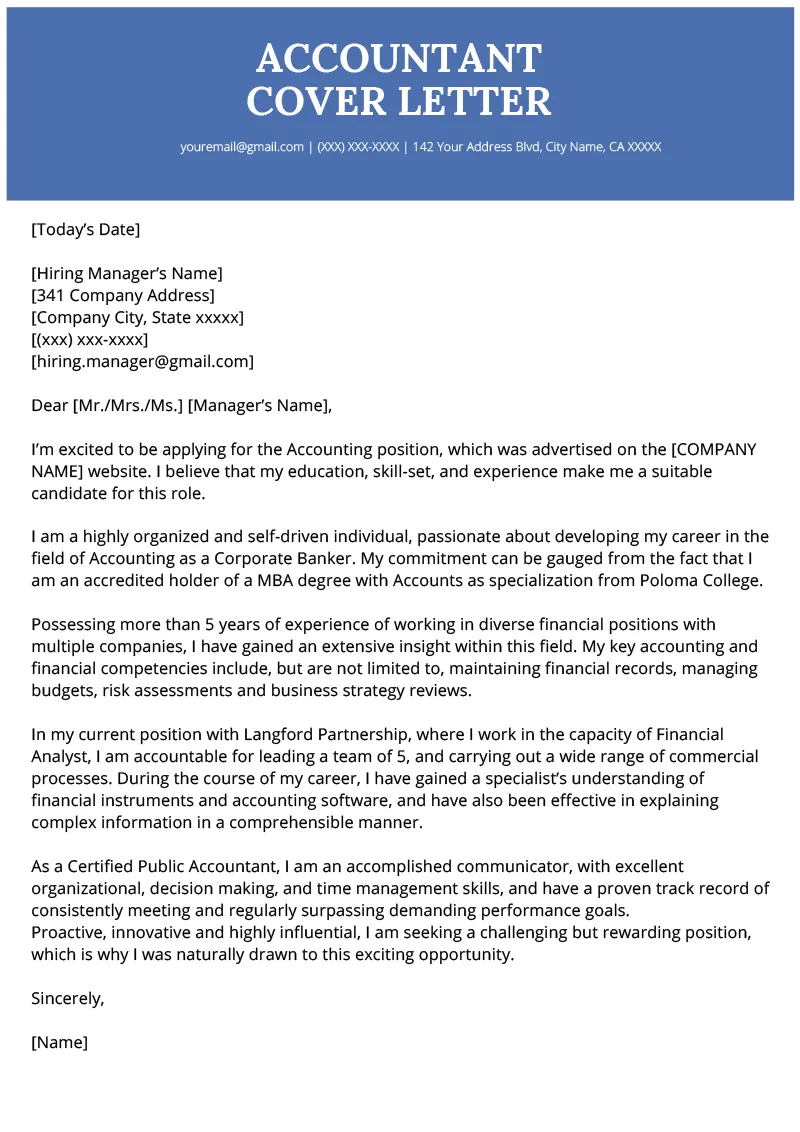Crafting a Powerful Financial Job Cover Letter
A well-crafted financial job cover letter is your first introduction to a potential employer, and it’s your chance to make a lasting impression. In the competitive world of finance, where attention to detail and precision are paramount, your cover letter should be a reflection of your skills and professionalism. This guide will help you navigate the crucial aspects of writing a compelling financial job cover letter that gets you noticed. The aim is to not only secure an interview but also to demonstrate your understanding of the financial industry and your ability to contribute to a company’s success. The key to success lies in thorough preparation, strategic content, and careful presentation.
Researching the Company and Role
Before you even begin to write, it is crucial to research the company and the specific role you are applying for. This demonstrates your genuine interest and allows you to tailor your letter to their needs. Start by visiting the company’s website, exploring their mission, values, and recent news. Look at their financial reports, if available, to understand their performance and challenges. Then, examine the job description meticulously. Identify the key skills and qualifications the employer is seeking and align your experience accordingly. This research will not only help you tailor your cover letter but also enable you to ask informed questions during the interview, showcasing your preparedness and initiative. Understanding the company culture and the specific requirements of the role is the foundation of a successful cover letter.
Understanding the Core of a Financial Job Cover Letter
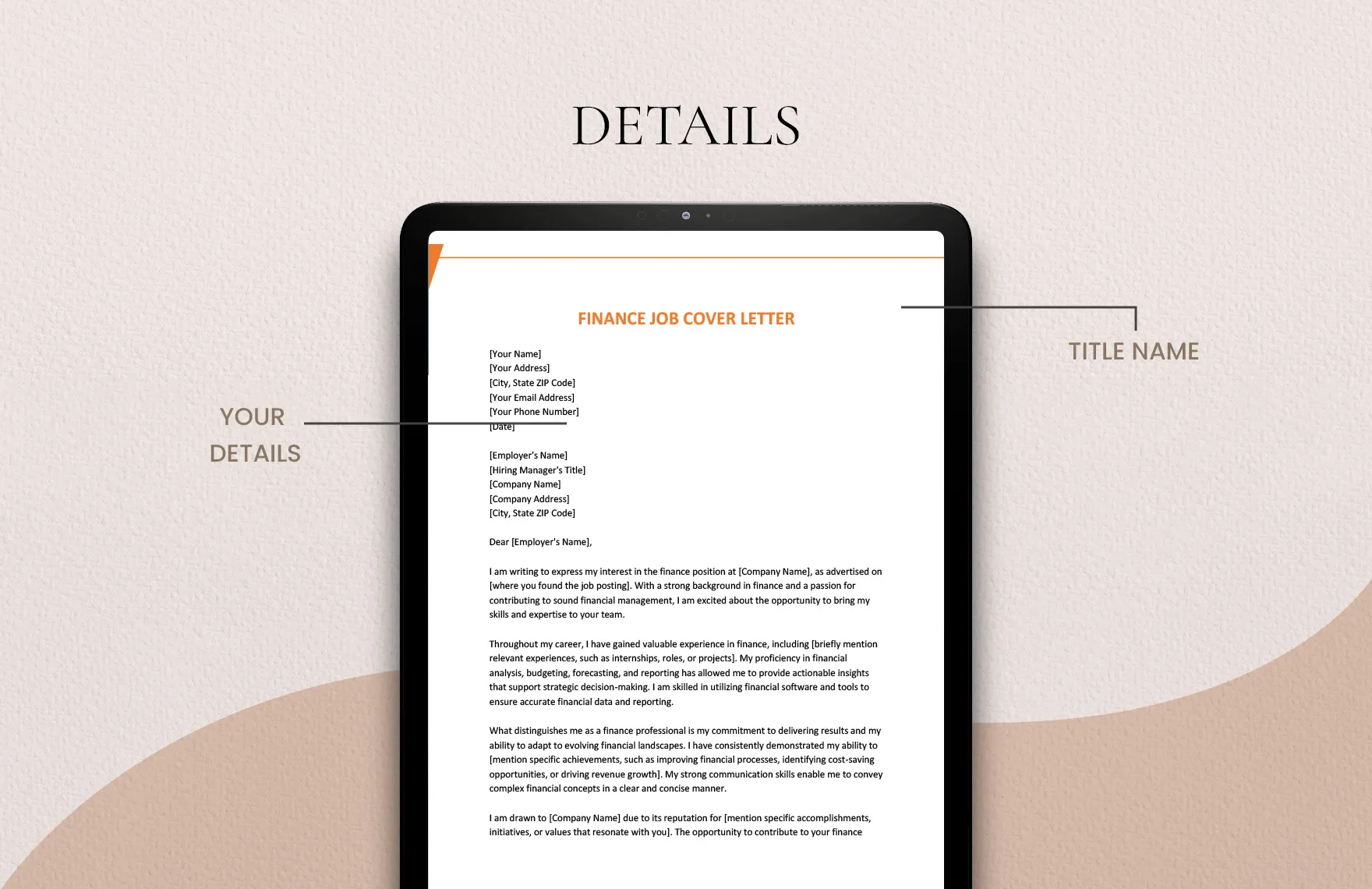
The core of your financial job cover letter should focus on showcasing your relevant skills, experience, and achievements. It is not just a summary of your resume; it’s an opportunity to elaborate on how your qualifications align with the company’s needs. Every sentence should add value by highlighting your strengths and demonstrating your understanding of the financial industry. The most effective letters clearly articulate your career goals, the value you can bring to the organization, and why you are an ideal candidate. Be concise and to the point, avoiding jargon that might not be understood by all readers. Tailor your language to reflect the tone and culture of the company, ensuring that your cover letter resonates with the hiring manager.
Highlighting Relevant Skills and Experience
When highlighting your skills and experience, focus on those that are most relevant to the job description. Financial roles demand a mix of technical and soft skills. Technical skills include financial analysis, budgeting, forecasting, and proficiency in financial software. Soft skills like communication, problem-solving, and teamwork are equally important. Provide specific examples that illustrate your abilities. Instead of simply listing skills, describe how you have applied them in previous roles to achieve positive outcomes. For example, you could mention how you improved the efficiency of a financial process or successfully managed a project within budget. By providing concrete evidence of your abilities, you make a stronger case for your candidacy.
Quantifying Achievements to Showcase Impact
Quantifying your achievements is essential in the financial sector, where numbers and data speak volumes. Whenever possible, provide specific metrics to demonstrate your impact. Instead of saying you “improved efficiency,” state by what percentage. Instead of saying you “managed a budget,” specify the size of the budget and any cost savings achieved. Use numbers to highlight your accomplishments. For example, you might have “reduced expenses by 15%” or “increased revenue by 10%.” These specific details give the hiring manager tangible evidence of your capabilities and the value you can bring to the company. This is a crucial element of any financial job cover letter.
Tailoring the Cover Letter for Each Application
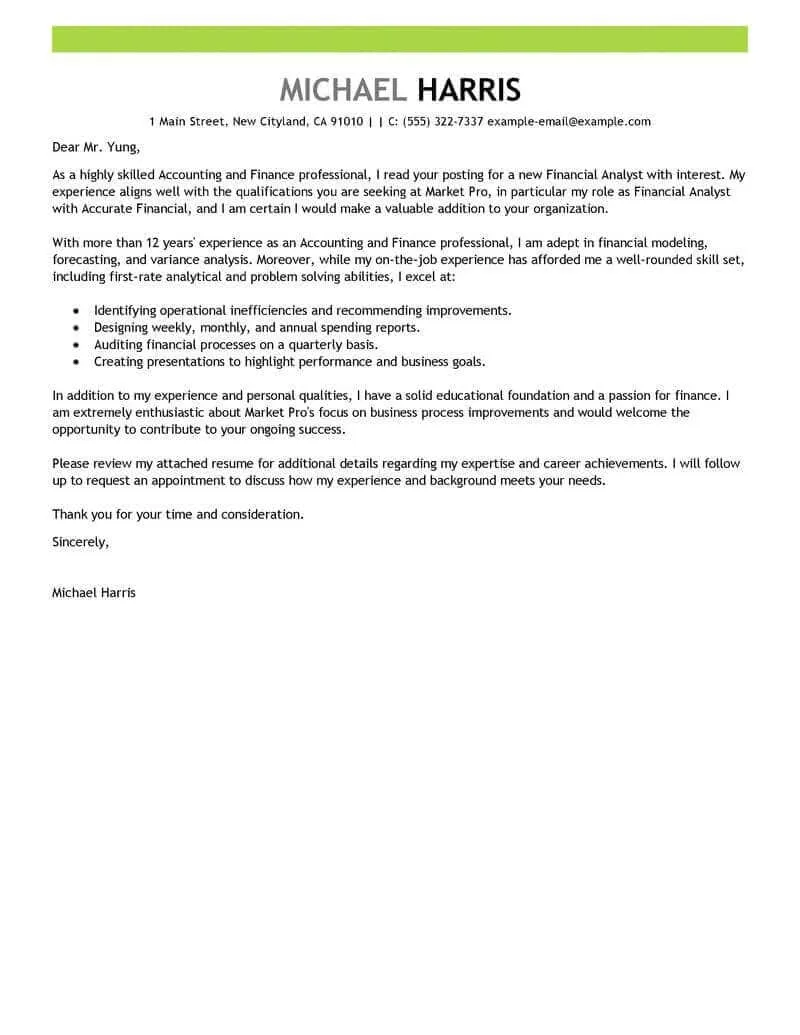
Generic cover letters are easily spotted and often discarded. To make a lasting impression, tailor each cover letter to the specific job and company. Refer to the job description and highlight the skills and experiences that match their requirements. Mention the company’s name and, if possible, the hiring manager’s name. Show that you have taken the time to understand their needs and are genuinely interested in the role. Avoid reusing the same letter for multiple applications. Investing time in personalization increases your chances of getting noticed and demonstrating your commitment to the role.
Formatting and Structure Best Practices
The format and structure of your cover letter should be professional and easy to read. Use a clear and concise format with a standard font like Times New Roman or Arial and a font size of 11 or 12 points. Keep the letter to one page in length. Start with a compelling opening, followed by a middle section that highlights your key skills and experiences. The middle section should include several paragraphs, each addressing a specific point. Conclude with a strong call to action. Use clear headings and subheadings to break up the text and improve readability. The structure should be logical, guiding the reader through your qualifications and why you are a good fit for the role.
Proofreading and Editing Your Cover Letter
Proofreading and editing your cover letter is a critical step in ensuring it makes a positive impression. Typos, grammatical errors, and formatting mistakes can undermine your credibility and suggest a lack of attention to detail, which is especially damaging in the financial industry. Carefully review your cover letter for any errors. Read it aloud to catch any awkward phrasing. Ask a friend, family member, or career counselor to review it as well. A second pair of eyes can often spot errors you may have missed. The goal is to ensure your cover letter is polished, professional, and error-free, as this reflects your commitment to excellence.
Actionable Steps to Make Your Cover Letter Shine
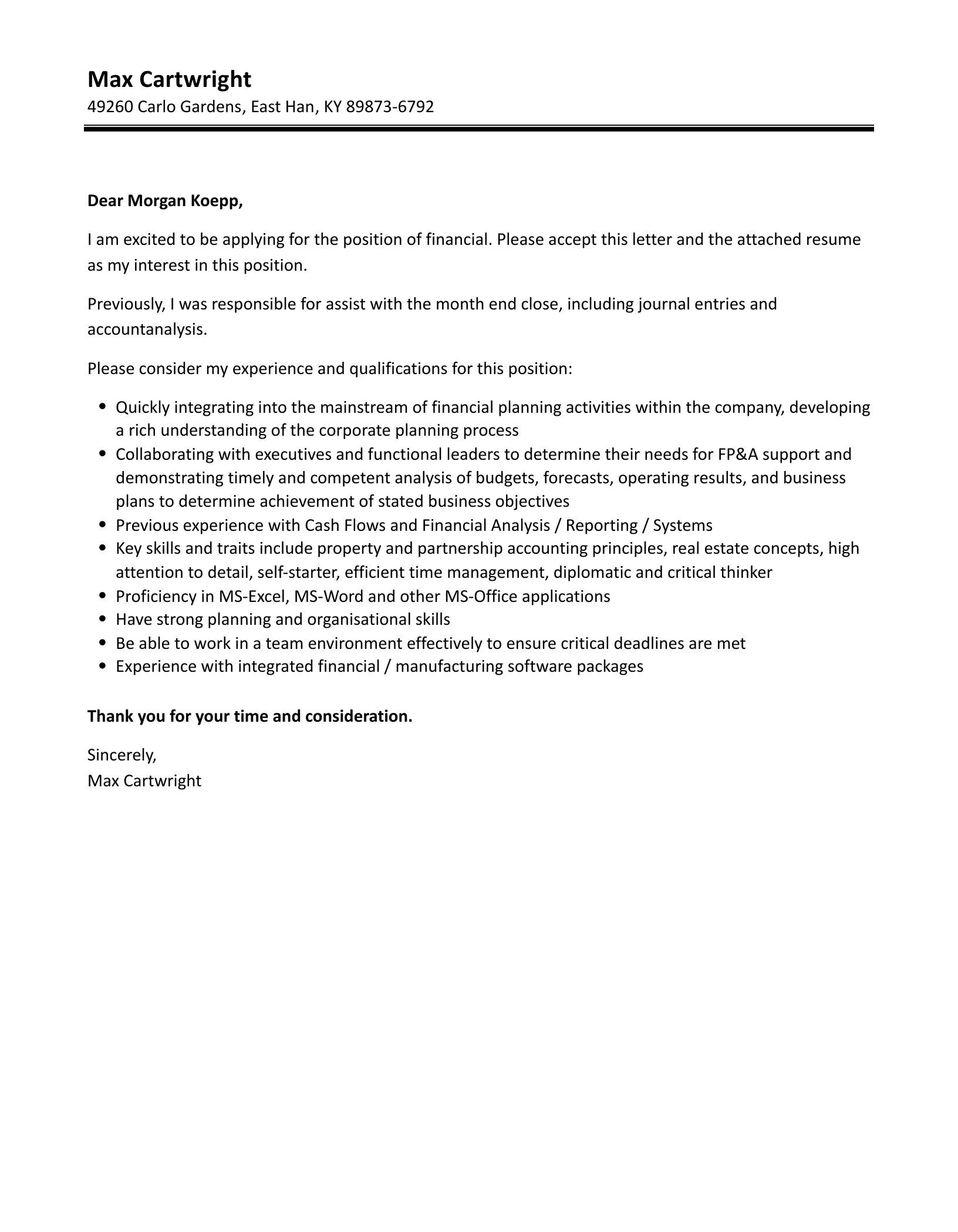
To make your cover letter shine, take actionable steps that will set you apart from other applicants. Before writing, research the company and the specific role you are applying for. Customize your letter to fit the job requirements, making sure you highlight the skills and experience most relevant to the position. Use strong verbs to describe your achievements and quantify your results whenever possible. Proofread and edit your cover letter carefully to ensure it is free of errors. Consider using keywords from the job description to help your application pass through applicant tracking systems. By following these steps, you will be well on your way to creating a cover letter that captures the attention of the hiring manager and increases your chances of securing an interview. Finally, have confidence in your abilities and let your passion for the financial industry shine through.
Creating a Compelling Opening
The opening paragraph of your financial job cover letter is your chance to capture the reader’s attention and make a strong first impression. It should immediately state your interest in the position and briefly explain why you are a good fit. Avoid generic openings like “I am writing to express my interest.” Instead, try to personalize the opening by mentioning something specific about the company or the role that attracted you. If you were referred by someone, mention their name. Briefly highlight one or two key accomplishments that are relevant to the job. The goal is to show your enthusiasm and make the hiring manager want to read more. Keep the opening concise and engaging, and clearly state your purpose.
Showcasing Financial Expertise
In the body of your cover letter, you need to demonstrate your financial expertise. Provide specific examples of your skills and experience, such as your proficiency in financial modeling, budgeting, forecasting, or financial analysis. Explain how you have used these skills in the past to achieve positive outcomes. Quantify your achievements whenever possible, using specific numbers and metrics to demonstrate your impact. Highlight any relevant certifications or licenses, such as a CPA or CFA designation. Use industry-specific terminology and show that you are familiar with the latest trends and best practices in the financial sector. Your goal is to present yourself as a knowledgeable and capable professional who can contribute to the company’s success.
Demonstrating Soft Skills
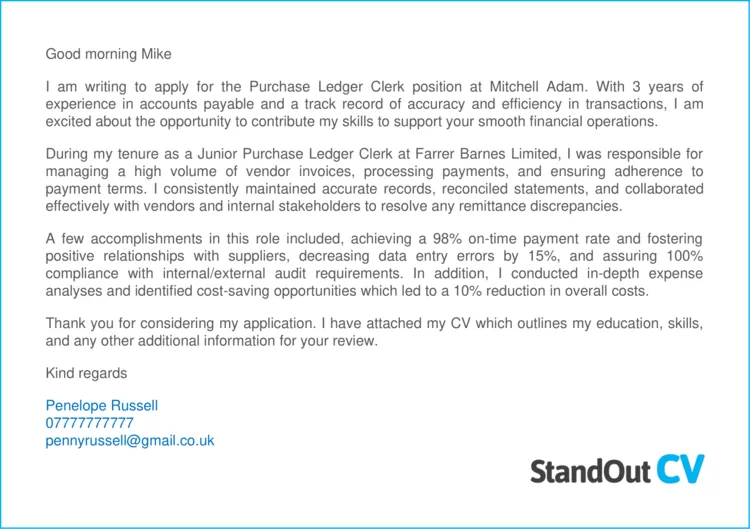
While technical skills are essential in finance, soft skills are equally important. Show the hiring manager that you possess strong communication, problem-solving, and teamwork skills. Provide examples of how you have collaborated with others, resolved conflicts, or communicated complex financial information to non-financial audiences. Highlight your analytical skills, your ability to pay attention to detail, and your commitment to accuracy. Explain how you have used your soft skills to achieve positive outcomes in previous roles. Demonstrating these skills shows that you are not just a qualified financial professional but also a well-rounded individual who can contribute to a positive work environment and fit into the company culture. Make sure to include teamwork and communication as critical soft skills.
Ending with a Strong Call to Action
The closing paragraph of your financial job cover letter should leave a lasting impression. Thank the hiring manager for their time and consideration, and reiterate your interest in the position. End with a strong call to action, such as expressing your desire for an interview and providing your contact information. Make it easy for the hiring manager to take the next step. Ensure your email address and phone number are clearly visible. Reiterate your confidence in your ability to contribute to the company’s success. Finish with a professional closing, such as “Sincerely” or “Best regards,” followed by your name. A well-crafted closing shows you are proactive and enthusiastic, increasing your chances of moving forward in the application process.
